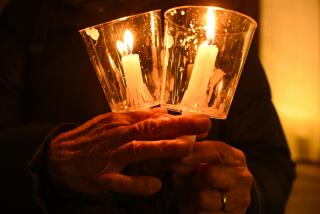Is God on Our Side? Or Is He on Theirs?
- Share via
Religious questions, if not commitments, regularly surface in times of duress. The terrorist attacks of Sept. 11 have led record numbers of people searching for answers to churches, mosques and synagogues.
This conflict has been fraught with religious connotations from its very inception. If, as the evidence seems to indicate, the perpetrators are Islamic militants, then it is certain they misunderstood their actions as jihad, a word that in mainstream Islam refers to the internal struggle humans must wage against their own resistance to God.
On the other hand, President Bush has spoken of America’s new war as a “crusade,” an equally unfortunate choice of words given the horrific evils visited upon on Muslims by Christians during the Middle Ages under that rubric.
The original name of America’s mobilization was “Operation Infinite Justice,” suggesting that this nation is the agent of the Almighty imposing God’s ultimate will on those who have wronged us.
Bush, in his speech to the nation, indicated in a more subtle way that God takes sides. “The course of this conflict is not known, yet its outcome is certain. Freedom and fear, justice and cruelty, have always been at war, and we know that God is not neutral between them,” he said.
The claim that God stands with the just is rooted in the ancient prophetic tradition shared equally by Muslims, Christians and Jews. Isaiah, Amos and many other biblical prophets declare God’s unrelenting thirst for justice and his distaste for the fatted offerings of those who unjustly lord it over the needy. This prophetic tradition has been vitally enacted in our time by theologians who argue that God makes a “preferential option for the poor,” that God stands with those who struggle for righteousness, with the despised and the rejected.
For Christian activists, the idea that the struggle for justice is no mere social program but the very bringing about of God’s kingdom provides confidence in the ultimate inevitability that right will win out regardless of mighty opposition.
This sentiment is evident in Martin Luther King’s famous affirmation that the “long arc of the universe may be slow to bend but it bends toward justice.”
President Bush’s claim, therefore, seems to be in continuity with a long, authentic prophetic vision of God.
But does God take sides in conflicts between human nations and groups? What are we to do when both parties claim God’s blessings upon their bellicose programs? What dangers come from claiming unqualified divine blessing on human causes and conflicts? Do we not lose our capacities for irony, detachment and self-criticism if we come to believe that God stands for our cause?
Most important, do we not run the risk of idolatry when we give our important but less than ultimate concerns and programs divine sanction and ultimacy?
For Muslims, idolatry, shirk, is the gravest of sins. Because the Arabic word, shirk, literally bears the meaning “association,” orthodox Muslims would be the first to caution all who associate their concerns with those of God.
Jewish and Christian thinkers would readily agree. Having witnessed the distorted self-certainty of an idolatrous violence that stands prepared to kill and be killed, should Americans not be more cautious about embracing the very rhetorical mode used by our enemies as we roll out the full might of our military complex? Especially against those who live in a nation ravaged by decades of unending strife?
The Bible does offer us another vision of God--a god who calls for justice but whose infinite love cares equally for the just and the unjust. This rhetorical tradition reminds us that God cannot be made captive to political or national agendas. According to the Bible: “You have heard that it was said, ‘You shall love your neighbor and hate your enemy.’ But I say to you, Love your enemies and pray for those who persecute you, so that you may be children of your Father in heaven; for He makes His sun rise on the evil and the good, and sends rain on the righteous and on the unrighteous.”
This tradition, without erasing the distinction between good and evil, between righteousness and unrighteousness, nonetheless reminds us that God cannot be monopolized by some regardless of the putative justice of their cause.
In times of wrenching grief and anger, it is easy to forget that God’s love calls us to check the instinctive furies released when those we cherish have been destroyed. It becomes too easy to bless our causes with unqualified divine approbation only to find ourselves made over in the likeness of those enemies who have injured us. We even sound like them when we speak of crusades and God’s favor, and when we picture ourselves as instruments visiting “infinite justice” on evil incarnate.
While those who long for peace hold only a fragile hope that the nation will exercise military restraint, we can at least vigorously call for rhetorical restraint in order to remind the nation that God is not at our disposal.
More to Read
Get the L.A. Times Politics newsletter
Deeply reported insights into legislation, politics and policy from Sacramento, Washington and beyond. In your inbox twice per week.
You may occasionally receive promotional content from the Los Angeles Times.










